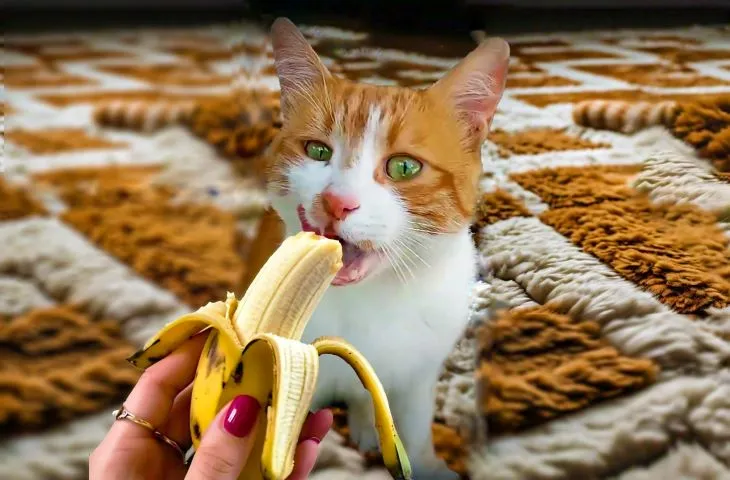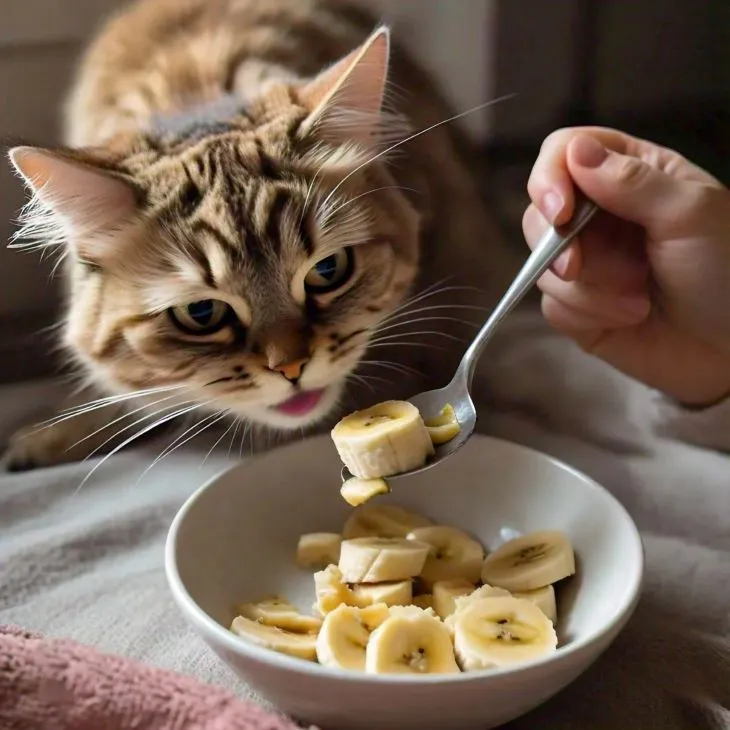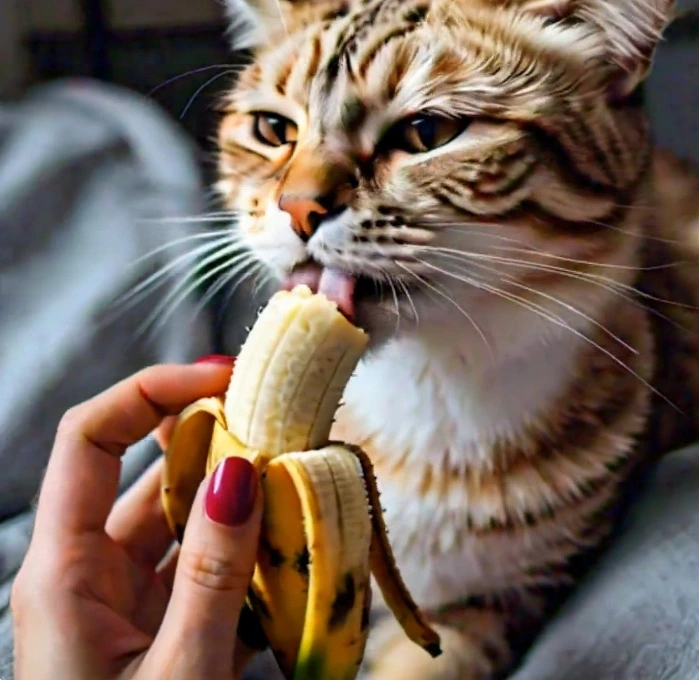Can Cats Eat Bananas? Everything You Need to Know
Yes, cats can eat bananas as an occasional treat but they should not make up more than 10% of their daily calories. If you face any issues, consult the vet.
By: Lana Koh

The information in this article is intended to educate cat parents and is not a substitute for veterinary guidance. In case of any concerns about your cat’s health, please talk with your veterinarian.
Although bananas are fruits full of potassium and their undeniable benefits, will they benefit your feline companion?
If your cat shows interest in eating bananas, you can feed them in moderation but not on a regular diet. The sugar present in bananas can cause diabetes in cats as well as many other complex health problems.
If you’re unsure and concerned about your cat’s love for bananas, wondering how much is safe, you’re not alone. As a cat parent and rescuer with over a decade of experience, I’m here to guide you through the ins and outs of feeding bananas to cats safely. Stick with this article, and you’ll learn everything you need to know.
Can Cats Eat Bananas?
Bananas may seem like a healthy snack for cats. But kitties don’t need fruit. Bananas have natural sugars that can cause tummy troubles or weight gain. It’s best not to make bananas a regular part of a cat’s diet.
As a rare treat, a tiny bite of banana is usually okay. But cats with diabetes or weight issues should avoid bananas completely. Nutrient snack alternatives for cats include tiny portions of cooked chicken or fish. So consider skipping the bananas for your furry friend. Their little tummies will be happier.
Interesting read: Can Cats Eat Pumpkins?
Are Bananas Good For Cats?
Bananas are very healthy for people. They have many good things, like fiber, magnesium, potassium, and vitamin C. That’s why bananas make a great snack. But cats don’t need bananas. Cat food has all the nutrients cats need already hence there is no need to add extra fruit.
Also, most cats don’t care much for sweet foods like bananas. Some cats might like a small bite as a treat. But too much banana can be bad for cats. Bananas have a lot of sugar, which is not good in large amounts.
Sticking to cat food for your cat’s main diet is better. Give healthy cat treats in moderation instead of table food like bananas.
Do Cats Like Bananas?
According to research, some ancient wild cats ate bananas long ago. But today’s latest research does not support this argument by saying that ancient cats focused on hunting meat only. Thus, bananas aren’t very high on the list of favorite feline foods.
Cats can’t taste sweet flavors well as they lack a receptor that detect sugary tastes. So, the sweet banana isn’t that appealing.
Some cats do seem to like bananas, though. They might like the soft texture of a ripe banana or they enjoy the fruity banana scent. But it’s probably not the sugary taste they’re after.
How To Feed Bananas To Your Cat?
If your cat begs for a taste of banana, you can give your kitty a little banana now and then if the vet says it’s okay. However, there are some precautions you should take when offering bananas to cats.
First, peel the banana where your cat can’t see. Cats shouldn’t eat the peel since they can’t digest it properly.

Next, cut the banana into tiny, bite-sized pieces for your cat. At first, just offer a tiny taste. See if your cat has any odd reactions that could mean an allergy.
Allergies to bananas are very rare in cats. But some kitties are allergic. If you notice wheezing, scratches, or other signs of allergy after eating a banana, call your vet right away.
If all goes well and the kitty wants more, you can share more banana. But don’t overdo it since bananas have natural sugar. A few tiny pieces occasionally can be an okay treat for cats. Just be sure to supervise snack time!
Nutritional Benefits Of Feeding Bananas To Cats
Bananas won’t hurt cats in tiny amounts. But they don’t offer much good nutrition for felines either. Let’s have a look at some of the positive and negative aspects of bananas for cats.

Potential Benefits
Bananas contain some healthy things like fiber, potassium, and vitamin C. Here’s how these might help cats:
- Potassium – This mineral supports heart and kidney health. However, excess potassium can pose health risks for felines as well. So moderation is key.
- Digestive Health – The fiber in bananas can help support your cat’s digestive health by promoting regular bowel movements and preventing constipation. However, too much fiber can also cause digestive issues, so it’s important to feed bananas in moderation.
- Fiber – Bananas provide fiber to promote healthy digestion. But too much fiber gives cats diarrhea. Cats also don’t extract maximum nutrition from fruit fiber.
- Energy Boost – Bananas contain natural sugars that can quickly boost your cat’s energy. This can be especially helpful for cats recovering from illness or surgery or older cats with decreased appetite.
- Folate – Bananas contain folate, a nutrient that assists cats with protein metabolism and forming new cells. However, most cat foods are already fortified with enough folate.
- Vitamin C – Bananas have vitamin C, which supports immunity. But most cats get enough vitamin C already from their cat food.
Risks/Side Effects Of Feeding Cats Bananas
While tiny banana tastes won’t directly harm most cats, some potential side effects exist. Let’s look at how bananas can negatively impact feline health.
Weight Gain Risks
Bananas are high in natural sugar and carbs. Too much can lead to:
- Excessive calories and weight gain
- Obesity over time
- Increased diabetes risk from blood sugar spikes
Digestive Upset
Elements of bananas may also cause digestive issues like:
- Diarrhea from too much fiber
- Vomiting or gas from trouble digesting fruit sugars and fiber
- Stomach cramps and discomfort
- Dehydration if diarrhea is severe
These side effects are more likely in cats with sensitive digestion. But any cat may get an upset stomach from overindulging in bananas.
Other Considerations
Cats also gain minimal nutritional value from fruit. Some cats have banana allergies, leading to itching, wheezing, diabetes, etc.
High Sugar Content
Bananas are relatively high in sugar compared to other fruits. Consuming too much sugar can lead to obesity, diabetes, and other health problems in cats. It’s important to limit the amount of bananas you feed your cat and to avoid feeding them bananas too often.
Allergies
Some cats may be allergic to bananas or other fruits. If you notice any signs of an allergic reaction, such as itching, swelling, or difficulty breathing, stop feeding your cat bananas immediately and contact your veterinarian.
Choking Hazard
Bananas can be a choking hazard for cats, especially if not cut into small pieces. Always cut bananas into small, bite-sized pieces before feeding them to your cat to reduce the risk of choking.
So, in the end, bananas are an occasional treat for cats at best. They don’t provide anything essential above and beyond a nutritionally-complete cat food diet. Talk to your vet before introducing any people’s foods.
Frequently Asked Questions
Conclusion
To summarize all discussion, bananas make a nice occasional treat for cats but should not become a regular part of their diet. While bananas are not toxic to cats, they provide no nutritional value above and beyond a complete cat food. The extra carbs, natural sugars, and fiber may cause digestive upset or weight gain in excess. As with any human food, ask your veterinarian before sharing to confirm safety based on your cat’s unique health profile. When in doubt, stick to high-quality commercial cat foods and cat treats for the best nutrition without risk.

About the Author
Lana Koh
Lana is a passionate cat lover with years of experience caring for her feline companions. As a dedicated volunteer at animal shelters, she’s gained valuable insights into the world of cats. Lana channels her love and knowledge into writing informative and engaging articles for fellow pet owners, covering topics like cat health, nutrition, grooming, behavior, and the special bond we share with our feline friends.
